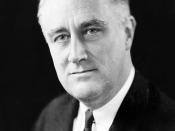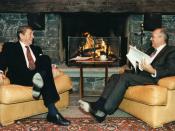In modern society, public perception of the United States president depends largely on television news coverage. Aware of this, presidents and presidential candidates manipulate the media to create favorable impressions of themselves and their policies. Acting in self-interest to entertain a large audience, the press often sensationalizes events and fails to fully inform the public on realities of news and current situations. The American public has grown disillusioned and apathetic and fails to turn to other sources to educate themselves. As a result, the public never sees an accurate reflection of a president's performance. In today's world, objective news reporting no longer exists. This paper traces how the press has gained increased control over the president's actions and largely determines the outcome of presidential elections.
American faith in the president as a bold leader who placed national good above self-interest began with George Washington, who was well known and admired for his ideology, self-discipline, restraint, and integrity.
Ever since this country began, Americans have held up its first president as the standard and expected his followers to equal his high moral character. This attitude of high expectation was expressed in Franklin Delano Roosevelt's nomination speech for candidate Al Smith in 1928. Roosevelt said Americans needed in a president, "that quality of soul which makes him a strong help to all those in sorrow or trouble, that quality which makes him not merely admired but loved by all people" (Shogan 2000).
During earlier centuries, presidents operated more independently of public observation. In the nineteenth century, Washington D.C. was still fairly isolated. News was reported through print media only. Then in 1883, Joseph Pulitzer, owner of the New York World, brought drama to the news and increased public interest in government affairs with a more flamboyant type of news coverage. Ultimately, his...



Dual Executive - An examination of how the media indirectly controls the government.
I thought this essay was thought provoking, considering Gulf War II and Arnett being canned for his views on the war.
7 out of 7 people found this comment useful.